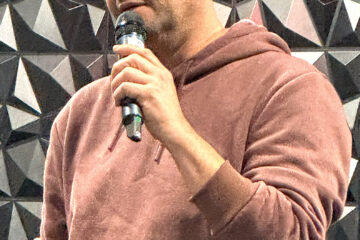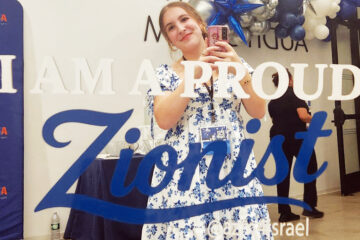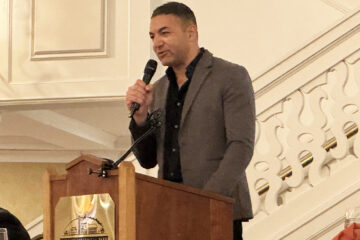WSU Muslim Student Assoc. speakers: Hamas’ massacre & aim of destroying Israel justified on religious grounds
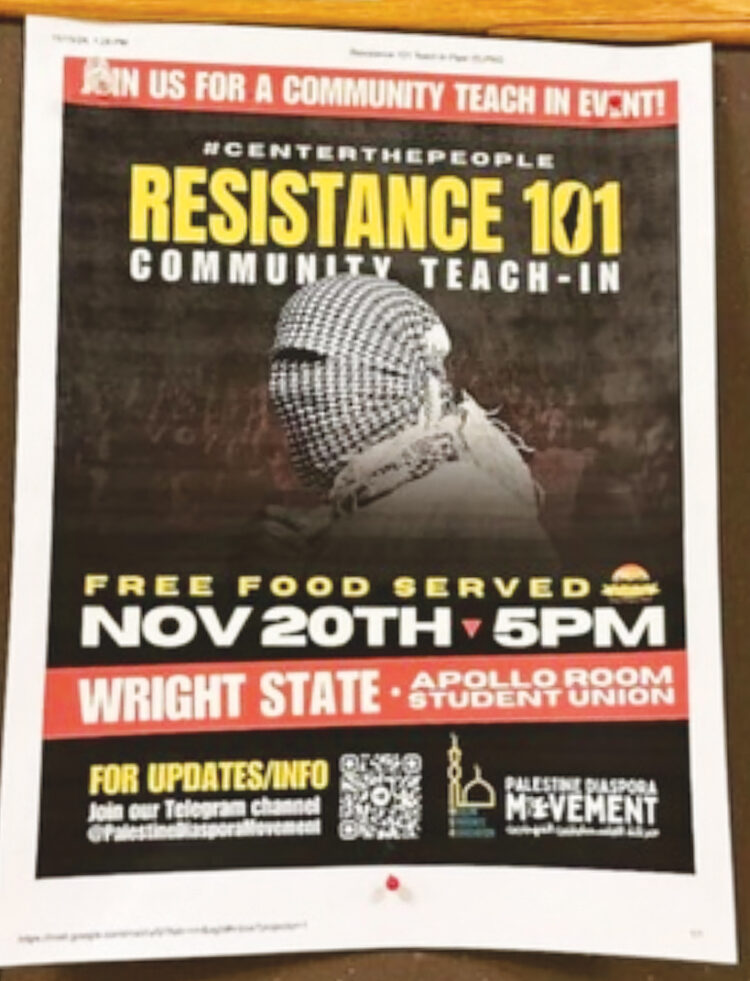
By Marshall Weiss, The Dayton Jewish Observer
With two Wright State University uniformed security officers standing visibly at the entrance of the Student Union’s Apollo Room, about 50 students attended the Palestine Diaspora Movement’s Resistance 101 Community Teach-In, Nov. 20, hosted by the university’s Muslim Student Association.
The Palestine Diaspora Movement describes itself as a “Muslim Youth-Led nonprofit grassroots organization dedicated to Palestinian liberation.”
“Our goal is that you leave here today, and you’ll have a clear understanding of what Palestinian resistance truly is, beyond headlines and misconceptions,” a member of the Palestine Diaspora Movement told participants.
The underlying message of the evening — albeit in euphemisms — was that the Oct. 7 Hamas massacre of more than 1,200 people in Israel and the terror organization’s goal of eliminating the Jewish state are justified within the religious precepts of Islam.
Guest speaker Thuraya Zeidan, a high school English teacher and adjunct college professor from New Jersey who runs an Instagram account called Decolonize the Classroom, set the tone via livestream with her thoughts on the meaning of Palestinian demands.
“The first one is liberation from the river to the sea,” Zeidan said, “and this is an important one, because this refers to the borders according to 1948. And oftentime, we hear the false misconception around, you know, business referred to 1967 borders. But when we say from the river to the sea, we mean all Palestine.”
She described the Palestinian Authority, which governs the West Bank, as not representing the Palestinian people, but rather as a political faction “put into place by the West.”
“Oftentimes, we refer to them as the arm of the Zionist regime and they serve Western interests and the interest of the settler Zionist regime. And they do this by arresting Palestinians (who are) organizing and resisting and handing them over to the secular Zionist regime in exchange for some monetary gain.”
Zeidan said the majority of predominantly Muslim nations in the world have “chosen the path of betrayal when it comes to Palestine,” and that Palestinians have “the right to resist and the right to revolution.”
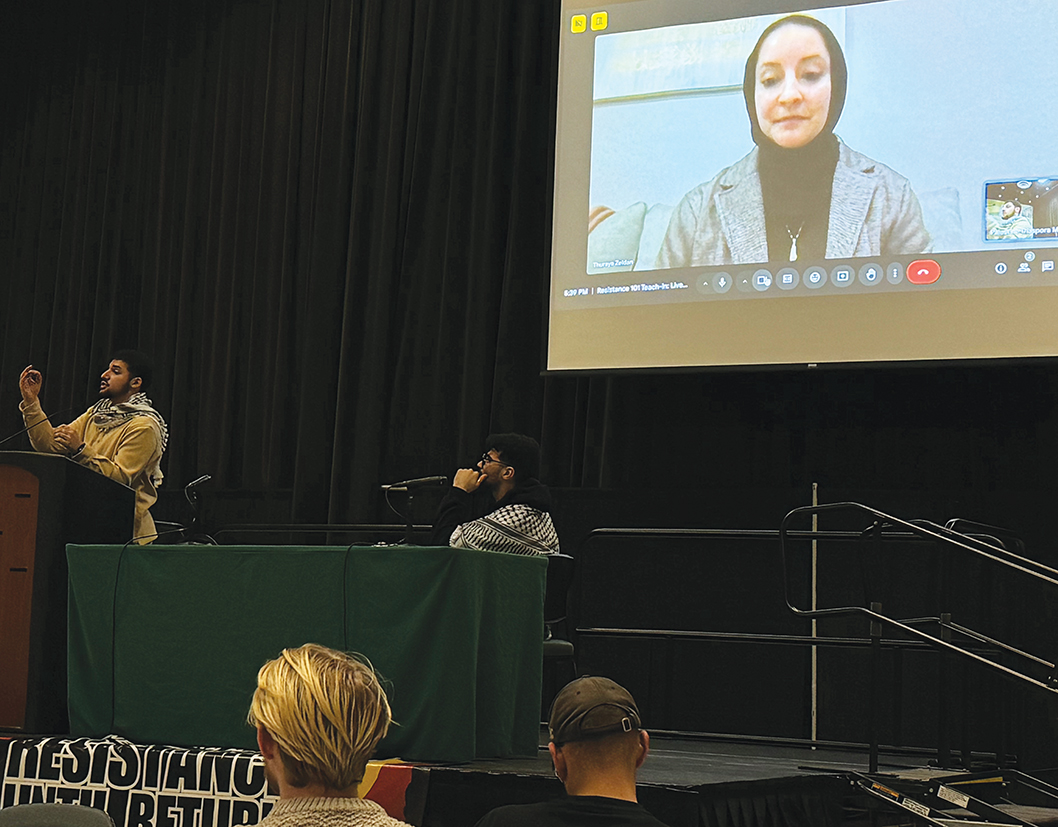
“And so, resistance, although this might be uncomfortable for some of us, that’s OK. This is part of the learning process, this is necessary. People have a right to protect their land and their people.”
She also emphasized to the audience that most Palestinians are Muslim, that Islam is ingrained in Palestinian life, and that “the martyrs and the prisoners sacrifice the most towards the liberation movement.”
Leaders with the Palestine Diaspora Movement provided attendees with an overview of its Resistance 101 course, which it offers at palestinediasporamovement.com.
Palestine Diaspora Movement’s Resistance 101 course states: “Martyrdom is a cornerstone of Palestinian resistance, especially in Gaza. It represents the ultimate act of bravery, honor, and personal sacrifice in the fight for Palestinian liberation, deeply intertwined with Islam.”
The coursework adds that “Zionists have weaponized Islamophobia by creating a negative connotation around the word ‘martyr,’ associating it with terrorism and extremism due to their anti-Muslim agenda. They propagate the notion that Palestinian martyrs, who are revered for their ultimate sacrifice in the struggle for liberation, are instead part of a broader, sinister agenda against ‘Western civilization,’ thus undermining their genuine acts of bravery and resistance.”
At the Wright State program, the Palestine Diaspora Movement distributed pamphlets, including one with phonetic Arabic chants and their English translations. Among them were “Palestine is Arab — from the river to the sea,” and “With our souls, with our blood, we sacrifice for Palestine.”
StopAntisemitism.org, an American nonprofit watchdog organization that combats Jew hatred, named Thuraya Zeidan an Antisemite of the Week in 2022.
The organization noted that Zeidan’s social media account, Decolonize the Classroom, “reveals her mission to indoctrinate youth with antisemitic bias by diminishing the identity and history of the Jewish people and spreading antisemitic conspiracy theories.”
StopAntisemitism.org added that Zeidan is on a mission to deliberately strip Jews of their identity. “Although there are millions of Brown and Black Jews, she repeatedly identifies Jews as ‘White’ and accuses them of ‘White supremacy.'”
Kelly Fishman, director of the Anti-Defamation League’s regional office, told The Observer that the Palestine Diaspora Movement’s efforts to address Palestinian displacement and oppression should not come at the expense of denying Israel’s right to exist or perpetuating harmful antisemitic tropes.
“True justice requires building bridges, rejecting divisive rhetoric, and ensuring that advocacy uplifts all voices without erasing the suffering of others,” Fishman said.
“As the ADL has consistently highlighted, combating systemic injustice requires recognizing the interconnected struggles of all marginalized communities, including Jewish people who have faced centuries of discrimination and violence.”
The university’s response
Wright State University Interim Director of Communications Bob Mihalek told The Observer via email that the university’s president, Susan Edwards, was unavailable to be interviewed. He provided a statement as the university’s response:
“As a public institution, Wright State University is subject to the First Amendment of the U.S. Constitution, and analogous provisions in the Ohio Constitution, regarding self-expression. The University supports freedom of speech and assembly. Because assemblies and demonstrations can constitute valuable experiences and opportunities for students, faculty, staff, and members of the public, Wright State makes on-campus space available for those activities. As a general rule, the space is available to all, regardless of the content of their opinions or the manner of their self-expression. The University does not necessarily endorse or oppose the speech of persons or organizations who choose to utilize that space, and no endorsement should be presumed from the fact that an individual or group is expressing their opinions on campus. Assemblies and demonstrations are subject to the requirements in Policy No. 1260: Expressive Activity; Free Speech.”
That university policy states that “speech may be constitutionally protected even though it is (or may be) considered by some to be extreme, indecent, offensive (including ‘hate speech’), controversial, ‘wrong,’ sexual, or even shocking.”
To read the complete January 2025 Dayton Jewish Observer, click here.


